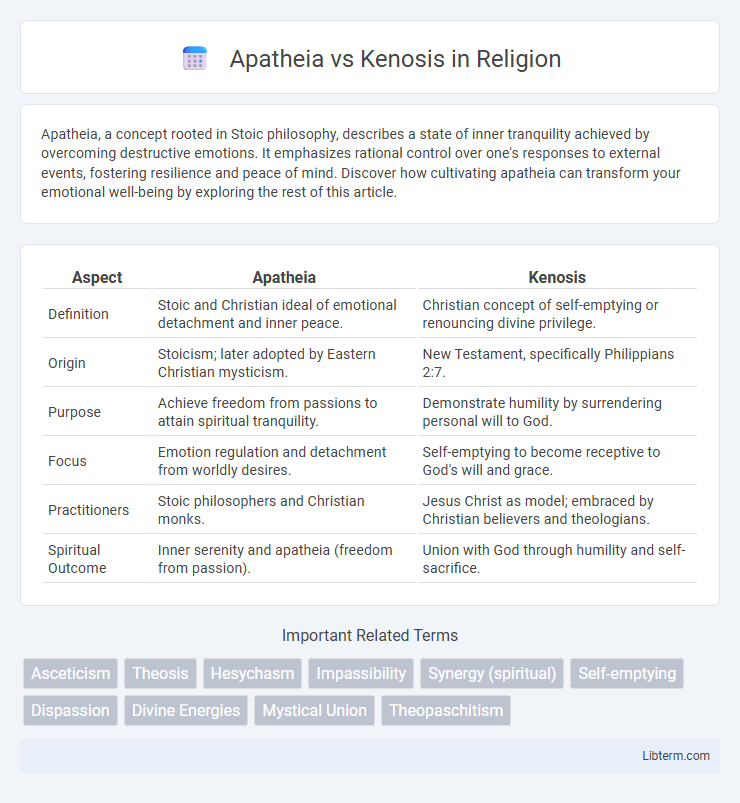Apatheia, a concept rooted in Stoic philosophy, describes a state of inner tranquility achieved by overcoming destructive emotions. It emphasizes rational control over one's responses to external events, fostering resilience and peace of mind. Discover how cultivating apatheia can transform your emotional well-being by exploring the rest of this article.
Table of Comparison
| Aspect | Apatheia | Kenosis |
|---|---|---|
| Definition | Stoic and Christian ideal of emotional detachment and inner peace. | Christian concept of self-emptying or renouncing divine privilege. |
| Origin | Stoicism; later adopted by Eastern Christian mysticism. | New Testament, specifically Philippians 2:7. |
| Purpose | Achieve freedom from passions to attain spiritual tranquility. | Demonstrate humility by surrendering personal will to God. |
| Focus | Emotion regulation and detachment from worldly desires. | Self-emptying to become receptive to God's will and grace. |
| Practitioners | Stoic philosophers and Christian monks. | Jesus Christ as model; embraced by Christian believers and theologians. |
| Spiritual Outcome | Inner serenity and apatheia (freedom from passion). | Union with God through humility and self-sacrifice. |
Understanding Apatheia: The Stoic Ideal
Apatheia, central to Stoic philosophy, signifies a state of being free from destructive emotions through rational detachment and self-control, fostering inner peace and resilience. Unlike Kenosis, which involves self-emptying in Christian theology to achieve humility and divine communion, Apatheia emphasizes emotional equanimity by aligning one's judgments with reason. Achieving Apatheia requires persistent practice of virtues such as wisdom, courage, justice, and temperance to maintain tranquility amid external chaos.
Exploring Kenosis: The Christian Concept of Self-Emptying
Kenosis, rooted in Philippians 2:7, embodies the Christian concept of self-emptying where Jesus Christ relinquishes divine privileges to fully embrace human vulnerability and humility. This theological principle emphasizes surrendering ego and personal desires to achieve spiritual purity and union with God, contrasting with Apatheia's focus on emotional detachment and inner tranquility. Understanding Kenosis enhances comprehension of Christ's redemptive sacrifice and encourages believers to practice selflessness, fostering a transformative spiritual humility central to Christian discipleship.
Historical Origins of Apatheia and Kenosis
Apatheia, rooted in Stoic philosophy, emerged in ancient Greece around the 3rd century BCE as a concept describing a state of freedom from passions through rational control and emotional detachment. Kenosis originates from early Christian theology, particularly in the New Testament letter to the Philippians, emphasizing the self-emptying of Christ's own will and becoming fully obedient to God's purpose. These distinct historical origins reflect differing spiritual and ethical frameworks: Stoicism's emphasis on individual rational mastery versus Christianity's focus on humility and divine surrender.
Key Philosophical Differences Between Apatheia and Kenosis
Apatheia, rooted in Stoic philosophy, emphasizes achieving a state of emotional tranquility by suppressing passions and disturbances, allowing rational control over one's responses. Kenosis, derived from Christian theology, involves the self-emptying of one's own will and desires to fully submit to divine will, emphasizing humility and spiritual surrender. The key philosophical difference lies in Apatheia's focus on inner emotional resilience through reason, whereas Kenosis centers on spiritual renunciation and divine alignment.
Spiritual Implications: Detachment vs. Self-Surrender
Apatheia emphasizes emotional detachment and inner tranquility as a means to spiritual freedom, rooted in Stoic philosophy, promoting control over passions to achieve moral clarity. Kenosis centers on the Christian concept of self-surrender, where one empties the self of personal will to fully embrace divine will, fostering humility and spiritual transformation. Both concepts highlight different paths to spiritual growth: Apatheia through rational mastery of desires, Kenosis through surrender and divine union.
Apatheia in Ancient Philosophy and Modern Practice
Apatheia in ancient philosophy, especially Stoicism, refers to a state of being free from irrational passions, achieving emotional tranquility through reason and self-control. Modern practice adopts Apatheia as a mindfulness approach to maintain emotional resilience and mental clarity in stressful situations. Unlike Kenosis, which emphasizes self-emptying for spiritual purification, Apatheia centers on inner stability by mastering desires and fears.
Kenosis in Christian Theology and Mysticism
Kenosis in Christian theology refers to the self-emptying of Jesus Christ's divine nature to fully embrace human limitations and suffering, as depicted in Philippians 2:7. This concept emphasizes humility and surrender, fostering a deep mystical union with God through the relinquishment of ego and worldly attachments. In comparison to Apatheia, which denotes emotional detachment in Stoicism, Kenosis encapsulates a transformative spiritual process central to Christian mysticism and the pursuit of holiness.
Psychological Perspectives on Apatheia and Kenosis
Apatheia, rooted in Stoic philosophy, denotes a state of emotional equanimity where destructive passions are quelled, promoting psychological resilience and mental clarity. Kenosis, originating from Christian theology, involves the self-emptying of ego and relinquishment of personal desires, which fosters humility and psychological transformation through surrender. Both concepts emphasize emotional regulation and self-detachment but differ in their mechanisms: apatheia prioritizes cognitive control over emotions, whereas kenosis focuses on spiritual self-abandonment to achieve psychological liberation.
Comparative Influence on Western Thought
Apatheia, rooted in Stoic philosophy, emphasizes emotional detachment and rational control as a path to inner peace, influencing Western thought on ethical self-discipline and personal resilience. Kenosis, originating from Christian theology, highlights self-emptying and humility as means to spiritual transformation and divine union, shaping Western concepts of sacrifice and grace. The comparative influence of Apatheia and Kenosis reveals contrasting approaches to human virtue--Stoic self-mastery versus Christian self-renunciation--each profoundly shaping Western ethical and spiritual paradigms.
Integrating Apatheia and Kenosis in Contemporary Life
Integrating Apatheia and Kenosis in contemporary life fosters emotional resilience and spiritual humility by balancing inner tranquility with self-emptying practices. Apatheia's emphasis on freedom from destructive passions complements Kenosis' call for relinquishing ego-driven desires, creating a holistic approach to mental well-being and ethical living. This synergy supports mindful decision-making and compassionate relationships in modern social and professional contexts.
Apatheia Infographic

 libterm.com
libterm.com